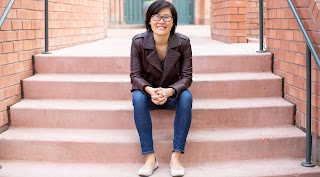For our guest blog post this week, we are delighted to feature a Q&A with novelist, memoirist, and MFA faculty member Rita Ciresi. A gifted writer and exceptional teacher, Rita teaches Mentorship Lab I, II, and III, working closely with small groups of students to help them find their voice and make their language sing. Here she shares with Sandy Chmiel her thoughts on writing, teaching, and the special way her Italian heritage informs her writing.
Q & A
with MFA faculty member Rita Ciresi
You write both fiction and nonfiction. Do you prefer one
more than the other? If so, in what way?
Each has
its own challenges and rewards, and puts me in an entirely different headspace.
When I'm writing fiction, I feel as if I'm in a dream world of my own
making. And since I'm starting from scratch--with just a snippet of dialogue
or a shadow of a character—every small detail needs to gestate a while before
it gets born on the page. With creative nonfiction, I'm mostly writing
from personal experience, and so the characters, dialogue, plot line, etc. are
already there. I can just spill out the material, then restructure and
revise over and over again.
Do you find it more challenging to work with students in an online-only
format rather than in a traditional classroom setting? Is it difficult to
make connections with your online students?
Years
ago, before sophisticated delivery platforms such as Blackboard and Canvas were
available to faculty, I taught a distance-learning course for a well-known
national writing organization. The communication I had with my students
was through the U.S. mail and (for those who had the technology), email on
those old-fashioned amber computer screens (Yes! Remember them?).
At that time I had my doubts about whether or not I could communicate
effectively with my students. But I soon discovered that after the first
trade of letters or emails, I grew extremely close to my students--in fact,
maybe even closer than I could face to face, as we were trading and critiquing
memoirs and personal essays in which the writer revealed quite a bit about
him/herself. Now, in the Bay Path MFA in Creative Nonfiction
program, we can use all of the technology at our disposal to grow closer as a
class—VoiceThread, Canvas, Google docs all help us to get to know one another
with lightning speed. But I think the essential nature of what we're
studying--creative nonfiction--is the key to our getting to know one another
quickly. Many of the students in the Bay Path program are writing memoir,
and our subject matter often demands that we lay it all out on the line right
away. I might argue that creative nonfiction is almost better discussed
and critiqued in a platform such as Canvas—as students might be more willing to
take risks and open up in the online environment.
How do you assess/evaluate
your online students?
Students
come to our program with different skill sets and specific goals. Our
focus on revision and improvement allows for student success across the board.
Which part of the Mentorship Lab courses do you most enjoy?
I love it
all--but what I most value is the sense of community we have in the Bay Path
program.
What kinds of books do you read in your spare time? Do you have a
favorite author?
Although
I love to get lost in the drama of a novel, the older I get, the more I want to
learn about something new when I sit down to read. So I read mostly
nonfiction--memoirs, collections of personal essays, and history written for a
popular audience. I have a strong interest in medical narratives, written
from the point of view of patients, physicians, nurses, and caregivers.
Please join me on Goodreads.com, where I chronicle my reading loves (and
sometimes my dislikes!)
What, besides writing, are you passionate about?
Yoga,
reading, and walking on the beach.
You often draw upon your Italian-American heritage. Have you
ever lived in or visited Italy?
Although
I've never been to Sicily, where my father was born, nor have I visited the
hometown of my maternal grandparents, I've had the pleasure of visiting Italy
as a tourist six or seven times and was lucky enough to be a visiting writer at
the American Academy in Rome some years back. Italy is a beautiful
country and has a rich and interesting culture. There's a big
difference, however, between being "Italian" and "Italian
American”—and this is subject matter that I've explored in both my fiction and
nonfiction.
Is there anything else you would like to share?
I'm proud
to be part of the inaugural faculty of the Bay Path program and value the
relationships I've forged with my colleagues and students.



Comments
Post a Comment